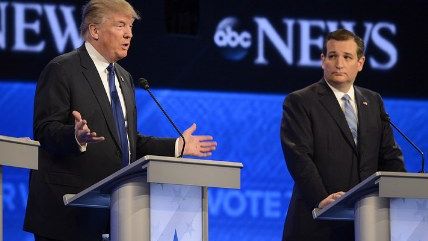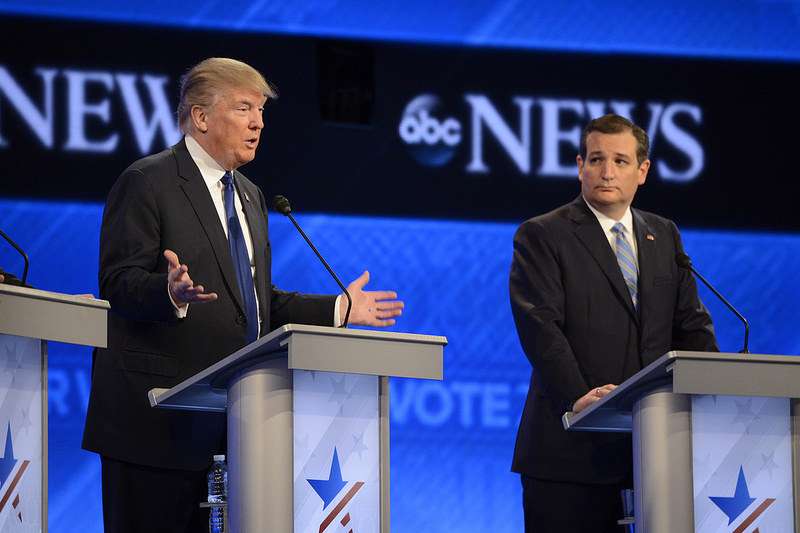California Republicans to Enjoy Brief, Fleeting Moment of Relevance
The combative GOP primaries put the state into play.


While it's true that California has essentially become a single party state in Sacramento, there are still plenty of Republicans scattered around (particularly inland). They don't get much love and don't have all that much influence on state government, but they do have representation in Congress (and just as with the coastal Democrats, the state's top-two election runoff system helps entrench single party domination in those areas).
Because the Republican Party's primaries are such a huge fight this election, it means that California's vote in June actually matters. The way the delegate math works out could hand Donald Trump the delegates he needs, or it could guarantee a contested Republican convention. From the Associated Press:
California's primary amounts to 54 separate races on a single day—one in every congressional district across the sprawling, diverse state, and one statewide. The winner in each district collects three delegates; then, the candidate who gets the largest number of votes statewide claims a bonus of 13 more.
That means a solidly Democratic district covering the heavily Hispanic neighborhoods east of downtown Los Angeles has the same importance as one in the traditional Republican heartland of Orange County, once the home of Richard Nixon.
Republicans account for a paltry 7 percent of the voters in the 13th Congressional District, which includes Oakland. But it awards three delegates to the winner, just like the 22nd District, a Republican fortress in the state's farm belt.
Polls have Trump ahead of Ted Cruz at the moment in California, but there are some factors in the state working against Trump. First, in California, the political parties get to decide whether or not to have open primaries. The Democratic Party primaries are open, but the Republican Party primaries are closed. You have to register as a Republican in order to vote for their candidates, denying Trump some possible cross-over or independent voters. There's also, beyond the typical Republican Party establishment loyalists, a significant number of Mormon and evangelical conservatives in the inland parts of the states. The percentages may be low compared to other states, but since we're talking about California, the flat numbers add up.
But working in Trump's favor, there are areas where the population demographics fit right into the wheelhouse of his voters. California was hit extremely hard by the recession and collapse of the housing bubble and some areas have not recovered. As Ron Bailey noted after Super Tuesday, Trump tends to win among Republican voters in those areas. If you check out the map Bailey references in his piece, once you look away from the coastal communities, California's inland looks as distressed as parts of the south (as does Arizona, which Trump won handily).
There is a lot of room for Cruz to maneuver in California and get those poll numbers up, but given that it's not a "winner-takes-all" state, the most likely end scenario is that nobody will run away with all the delegates. California won't stop Trump's march, but Cruz and even John Kasich can use the state to keep Trump from hitting the delegate threshold.
So California Republicans can look forward to actually being courted for their votes. The last time this happened was back in 2008 when California moved its primaries earlier to Super Tuesday. California helped Sen. John McCain secure the Republican nomination.
And then they can "look forward" to their votes completely not mattering in November when the state overwhelmingly votes for whomever the Democratic nominee is. Though it's interesting to note that while the state's Republican Party has been losing membership, they're not trading sides and joining the Democrats. They're declaring their independence from party membership entirely, making it harder to predict where they might go in the fall. Those are the kind of voters Trump lives for.


Show Comments (38)